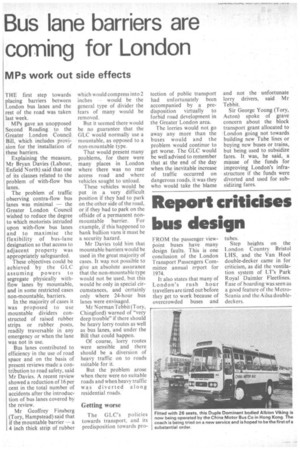Bus lane barriers are coming for London
Page 22

If you've noticed an error in this article please click here to report it so we can fix it.
MPs work out side effects
THE first step towards placing barriers between London bus lanes and the rest of the road was taken last week.
MPs gave an unopposed Second Reading to the Greater London Council Bill, which includes provision for the installation of these barriers.
Explaining the measure, Mr Bryan Davies (Labour, Enfield North) said that one of its clauses related to the problem of with-flow bus lanes.
The problem of traffic observing contra-flow bus lanes was minimal — the Greater London Council wished to reduce the degree to which motorists intruded upon with-flow bus lanes and to maximise the flexibility of bus-lane designation so that access to adjacent property was appropriately safeguarded.
These objectives could be achieved by the GLC assuming powers to segregate physically withflow lanes by mountable, and in some restricted cases non-mountable, barriers.
In the majority of cases it was proposed to use mountable dividers constructed of raised rubber strips or rubber posts, readily traversable in any emergency or when the lane was not in use.
Bus lanes contributed to efficiency in the use of road space and on the basis of present reviews made a contribution to road safety, said Mr Davies. A recent review showed a reduction of 16 per cent in the total number of accidents after the introduction of bus lanes covered by the review.
Mr Geoffrey Finsberg (Tory, Hampstead) said that if the mountable barrier a 4 inch thick strip of rubber which would compress into 2 inches would be the general type of divider the fears of many would be removed.
But it seemed there would be no guarantee that the GLC would normally use a mountable, as opposed to a non-mountable type.
That would present many problems, for there were many places in London where there was no rear access road and where vehicles sought to unload.
These vehicles would be put in a very difficult position if they had to park on the other side of the road, or if they had to park on the offside of a permanent nonmountable barrier. For example, if this happened to bank bullion vans it must be a security hazard.
Mr Davies told him that mountable barriers would be used in the great majority of cases. It was not possible to give an absolute assurance that the non-mountable type would not be used, but this would be only in special circumstances, and certainly only where 24-hour bus lanes were envisaged.
Mr Norman Tebbit (Tory, Chingford) warned of "very deep trouble" if there should be heavy lorry routes as well as bus lanes, and under the Bill that could happen.
Of course, lorry routes were sensible and there should be a diversion of heavy traffic on to roads suitable for it.
But the problem arose when there were no suitable roads and when heavy traffic was diverted along residential roads.
Getting worse The GLC's policies towards transport, and its predisposition towards pro tection of public transport had unfortunately been accompanied by a predisposition virtually to forbid road development in the Greater London area.
The lorries would not go away any more than the buses would and the problem would continue to get worse. The GLC would be well advised to remember that at the end of the day when the inevitable increase of traffic occurred on dangerous roads, it was they who would take the blame and not the unfortunate lorry drivers, said Mr Tebbit.
Sir George Young (Tory, Acton) spoke of grave concern about the block transport grant allocated to • London going not towards building new Tube lines or buying new buses or trains, but being used to subsidize fares. It was, he said, a misuse of the funds for improving London's infrastructure if the funds were diverted and used for subsidizing fares.




























































































